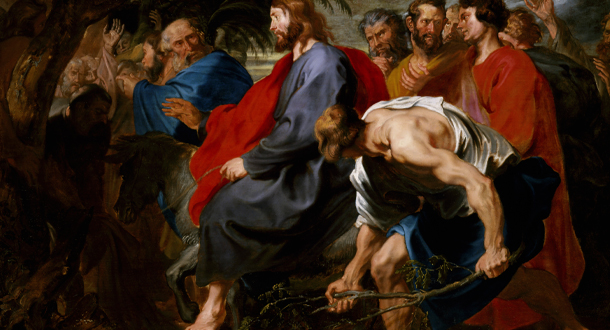
Scripture:
Reflection:
Today’s readings, woven together on this final day before Holy Week, portray a compelling portrait of our salvation history as a people of God.
In the first reading from the Book of Ezekiel, God gathers his people (us) together as one “to bring them back to their land” (Heaven). He proclaims that he will “make them one nation upon the land”. “There shall be one prince (Jesus) for them all. “Never again shall they be divided into two kingdoms” (good and evil). He will “cleanse them so that they may be his people, and he may be their God”. God appoints his servant David as the temporal prince and shepherd of his people. However, 1,000 years later, Jesus will supersede David as the eternal Prince of Peace. God goes on to proclaim that his people will live on this land forever. That will include not only current generations but also their children and their children’s children forever…. Therefore, ultimately all nations and all peoples of the earth, even those yet to be born for the rest of time. God says that he will multiply them and put his sanctuary among them forever. He will make an everlasting covenant with his people through his son. His sanctuary shall be set among us forever.
In John’s Gospel reading the anticipation of the imminent arrest, torture and death of this Prince of Peace and Shepherd of God’s people is real. Some of the Jews had gone to the Pharisees to tell them what Jesus had done. This presents a dilemma for the Jewish hierarchy. “This man is performing many signs. If we leave him alone, all will believe in him and the Romans will come and take both our land and our nation. However, from the first reading we know that no one can take the land from God’s chosen people. God’s sanctuary has been set up among us forever.
Caiaphas, the high priest, becomes instrumental in salvation history. He chastises his own people: “You know nothing, nor do you consider that it is better for you that one man should die instead of the people, so that the whole nation may not perish.” The gospel proclaims that Caiaphas himself “prophesied that Jesus was going to die for the nation, and not only for the nation, but also to gather into one the dispersed children of God.” Isn’t that precisely what God had promised in the first reading. Caiaphas could not have known how impactful his own words were. “So, from that day on they planned to kill him.” The wheels had been set in motion. Jesus was going to come to Jerusalem for his final feast to offer himself up on a cross to fulfill what his father had proclaimed 1,000 years previously. Still there were skeptics among the people: “They looked for Jesus and said to one another as they were in the temple area, “What do you think? That he will not come to the feast?”. How could he not come to the feast? It was, after all, his own feast that had been set in motion from the beginning of time. He was going to give up his life for the salvation of his people.
One week from today we will again be mourning and simultaneously celebrating the death of this Prince of Peace, the eternal Shepherd of God’s people. He has come to fulfill the promise that his father had given to the Israelites 1,000 years before his birth. In his final moments on the cross, Jesus expresses his own sentiment: “It is finished”. By his own passion and death he has fulfilled that promise that his father had made to all of us so many centuries ago. Thank you, Jesus.
Have a blessed Holy Week. May the Passion of Jesus Christ be always in our hearts.
Bill Berger has had a lifelong relationship with the Passionist Family. Bill and his wife, Linda, are currently leaders of the Community of Passionist Partners (CPPs) in Houston, Texas.
